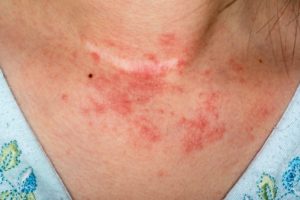
Atopic dermatitis patients are encouraged to engage in more weight-bearing exercises, increase their calcium and vitamin D intake, and speak to their doctor about the use of corticosteroids as older adults tend to be more sensitive to their effects.
The researchers suggest that additional research is required to highlight key risk factors that link atopic dermatitis with osteoporosis and osteopenia and the role that medications play in the formation of osteoporosis. Furthermore, they wish to uncover possible treatments.
What Is Atopic Dermatitis?
Atopic dermatitis is most commonly seen among children but can occur at any age. There is currently no cure for atopic dermatitis, but treatments can relieve itchiness and other symptoms.
Symptoms of atopic dermatitis include red, itchy skin; red to brownish patches on the hands, feet, ankles, wrists, neck, upper chest, eyelids, inside the bend of the elbows and knees, and in infants, the face and scalp; small raised bumps which can leak fluid or crust; thickened, cracked, or scaly skin; and raw sensitive skin which is irritated from scratching.
Atopic dermatitis is often caused by a gene variant that causes the skin to be unable to protect itself from bacteria along with retaining moisture. Allergies may also play a role in it.
To reduce symptoms and itchiness, patients can try the following:
- Moisturize frequently
- Try to identify and avoid triggers
- Take shorter baths or showers
- Use gentle soaps
- Dry yourself completely and follow up with moisturizer
You should see a doctor if performing daily activities and sleeping is uncomfortable, the skin becomes infected, and if symptoms persist even with the use of home remedies.
Also read:
- Can osteoporosis be reversed? 12 natural ways to treat osteoporosis
- Osteopenia vs. osteoporosis: Understanding the difference